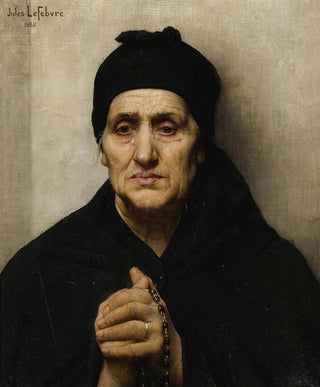Art print | An elderly Greek woman - Jules Joseph Lefebvre


View from behind

Frame (optional)
In the rich and captivating universe of academic art, the artwork "An Elderly Greek Woman" by Jules Joseph Lefebvre stands out for its emotional depth and delicate portrayal of the human condition. This painting, which evokes wisdom and the beauty of times gone by, invites the viewer to engage in a silent dialogue with the female figure it depicts. Lefebvre, a master of academicism, manages to capture not only the physical appearance of his subject but also her essence, memories, and struggles. The elderly Greek woman, with her gaze full of life experience, thus becomes a timeless symbol of femininity and resilience.
Style and uniqueness of the artwork
Lefebvre's style is characterized by meticulous realism and particular attention to detail. In "An Elderly Greek Woman," the texture of the skin, the folds of the clothing, and the shine of the hair are rendered with remarkable precision, demonstrating exceptional technical skill. The color palette, both soft and rich, enhances the nostalgic atmosphere of the piece. Every brushstroke seems charged with emotion, and the light plays a crucial role in highlighting facial features and creating an intimate ambiance. This painting does not merely depict a woman; it tells a story, that of a life marked by trials and joys. Lefebvre succeeds in transcending simple representation to offer a poetic vision of humanity.
The artist and his influence
Jules Joseph Lefebvre, born in 1836, is an emblematic figure of 19th-century French art. Trained at the École des Beaux-Arts in Paris, he quickly established himself as a renowned artist, winning numerous awards and distinctions. His ability to fuse tradition and innovation influenced many artists of his time and subsequent generations. Lefebvre was not only a painter but also a teacher, sharing his passion and expertise with his students. His commitment to academic art and respect for classical techniques contributed to shaping the artistic landscape of his era. "An Elderly Greek Woman" perfectly illustrates his approach, blending impeccable technique

Matte finish

View from behind

Frame (optional)
In the rich and captivating universe of academic art, the artwork "An Elderly Greek Woman" by Jules Joseph Lefebvre stands out for its emotional depth and delicate portrayal of the human condition. This painting, which evokes wisdom and the beauty of times gone by, invites the viewer to engage in a silent dialogue with the female figure it depicts. Lefebvre, a master of academicism, manages to capture not only the physical appearance of his subject but also her essence, memories, and struggles. The elderly Greek woman, with her gaze full of life experience, thus becomes a timeless symbol of femininity and resilience.
Style and uniqueness of the artwork
Lefebvre's style is characterized by meticulous realism and particular attention to detail. In "An Elderly Greek Woman," the texture of the skin, the folds of the clothing, and the shine of the hair are rendered with remarkable precision, demonstrating exceptional technical skill. The color palette, both soft and rich, enhances the nostalgic atmosphere of the piece. Every brushstroke seems charged with emotion, and the light plays a crucial role in highlighting facial features and creating an intimate ambiance. This painting does not merely depict a woman; it tells a story, that of a life marked by trials and joys. Lefebvre succeeds in transcending simple representation to offer a poetic vision of humanity.
The artist and his influence
Jules Joseph Lefebvre, born in 1836, is an emblematic figure of 19th-century French art. Trained at the École des Beaux-Arts in Paris, he quickly established himself as a renowned artist, winning numerous awards and distinctions. His ability to fuse tradition and innovation influenced many artists of his time and subsequent generations. Lefebvre was not only a painter but also a teacher, sharing his passion and expertise with his students. His commitment to academic art and respect for classical techniques contributed to shaping the artistic landscape of his era. "An Elderly Greek Woman" perfectly illustrates his approach, blending impeccable technique






